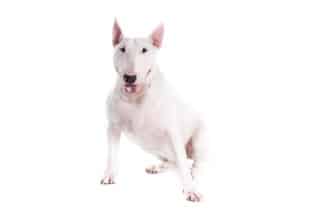
The Miniature Bull Terrier is a small-sized, muscular, and sporty breed that originated in England in the late 19th century. This breed was created by crossing small English bulldogs and the old-style English terrier. They are known for their unique egg-shaped head and strong neck.
This breed has short and dense fur that is often white in colour with coloured spots, or coloured with white over their neck, chest, legs, back, and tail. The Miniature Bull Terrier may also have a black, brindle, or fawn-coloured coat. The breed typically has small triangular ears that perfect fold over, a nose that is black or brown in colour, and almond-shaped eyes that are usually dark in colour. The tail of the breed is usually set high and has a slight upward curve.
The breed stands about 10 to 14 inches tall and typically weighs anywhere between 20 to 24 pounds.
Miniature Bull Terriers are known for being loyal and a little bit stubborn, but they often make great family and companion animals. They are known for their courageous and lively nature, making them an ideal choice for families with children, as well as those looking for an active and intelligent playmate.
What makes the Miniature Bull Terrier stand out among other breeds is their unique egg-shaped head, an appearance which was created by careful breeding in the late 19th century. Specifically, their origins are thought to be a combination of the small English Bulldog, the old-style English Terrier, the Manchester Terrier, and the Bull and Terrier hybrids. This is what set the Miniature Bull Terrier apart from the larger Bull Terriers created from
The Miniature Bull Terrier is a loyal and energetic breed that makes for an excellent companion. Bred to hunt, this agile and playful breed is both clever and loyal. Possessing a strong and determined temperament, Miniature Bull Terriers need owners who are firm yet gentle in their training and who establish a socialization program from a young age. Miniature Bull Terriers are medium-energy dogs that are eager to play and engage in physical activities. They do best with daily walks, runs, and playtime. While they can be kept indoors, they do prefer time spent outdoors getting plenty of exercise and exploring. Miniature Bull Terriers can be noisy, so early training is important to ensure good manners in the home. The breed gets along with children and other pets, provided they have been socialized appropriately. They form strong bonds with their owners and, when given regular exercise, will make a loyal and devoted companion.
The Miniature Bull Terrier has a muscular body structure and requires daily exercise to stay fit. Nutritional requirements and feeding guidelines for these dogs depend on their lifestyle, age, and health. As with all dogs, a healthy diet is key for longevity and overall health. A balanced diet of fresh and high-quality pet food as well as snacks are important for these dogs, and the amounts should be determined by a veterinarian or nutritionist. Feeding your Miniature Bull Terrier is a way of expressing your love for them, and by providing them with a balanced diet, you will help them to live a long and healthy life.
The Miniature Bull Terrier needs a balanced diet of fresh and high-quality pet food as well as snacks in order to stay fit and healthy. Responsible owners should consider adoption or rescue when looking for this breed of dog, and Way Canina can offer guidance on nutritional requirements and feeding guidelines. With the right diet and love, this breed of dog will thrive.
The Miniature Bull Terrier is known to be an energetic breed with a strong prey drive. They are typically healthy but can be prone to certain health issues, such as deafness, hypothyroidism, cardiac conditions, and orthopedic problems. Genetics can play a role in some of these conditions, so it is important to have regular veterinary check-ups to monitor their health. Vaccinations and preventive care are also important to ensure the overall health of your Miniature Bull Terrier.
Grooming should include frequent brushing, bathing, and ear cleaning to keep their coat shiny and free of mats. A balanced diet and portion control is essential for Miniature Bull Terriers to avoid becoming overweight. Regular exercise will also help to prevent obesity and ensure their long-term health.
The life expectancy of a Miniature Bull Terrier is about 12 to 16 years, although this can be influenced by several factors, such as genetics, diet, exercise, and healthcare. With the proper preventive care and health maintenance, your Miniature Bull Terrier can live a long and happy life.
Responsible owners should consider adoption or rescue when looking for a Miniature Bull Terrier, and Way Canina is a great source for all the information you need. Knowing the nutritional requirements and feeding guidelines for your beloved pet is an important aspect of keeping them healthy, and Way Canina has an abundance of data and research to help you determine what is best for your Miniature Bull Terrier. Making sure you understand what types of foods are good for your dog and which type should be avoided is an important part of responsible ownership.
Are you thinking about getting a Miniature Bull Terrier? As responsible pet owners, it’s important to consider the pros and cons of any breed before making a decision. Be sure to check out our blog posts and articles on Way Canina to compare different breeds. In addition to comparing breeds, you’ll also find valuable information on dogs’ lifestyle and wellbeing.